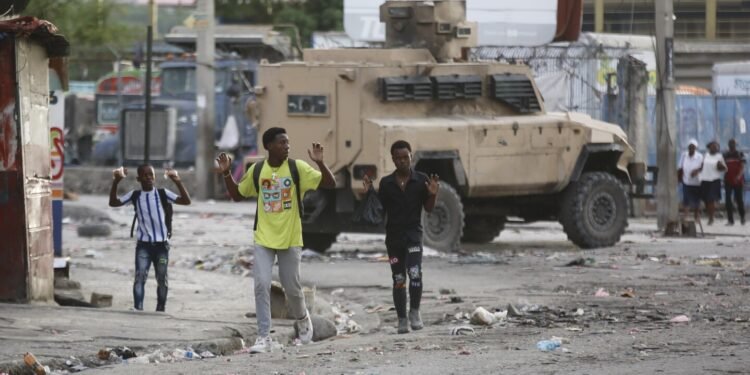MIAMI (news agencies) — When Haitian Prime Minister Ariel Henry filled the void left by the assassination of the country’s president in 2021, he did so over the protest of wide segments of the population but with the full-throated support of the Biden administration.
Now, almost three years later, Henry’s grip on power is hanging by a thread, and Washington is confronted by even worse choices as it scrambles to prevent the country’s descent into anarchy.
“They messed it up deeply,” James Foley, a retired career diplomat and former U.S. ambassador to Haiti, said in an interview about the Biden administration’s support for Henry. “They rode this horse to their doom. It’s the fruit of the choices we made.”
The embattled prime minister left Haiti 10 days ago and has since crisscrossed the world — from South America to Africa to New York and now Puerto Rico — all while staying silent as he tries to negotiate a return home that seems increasingly unlikely.
The power vacuum has been exacerbated by the almost complete withdrawal of police from key state institutions and a mass escape of hundreds of murderers, kidnappers and other violent offenders from the country’s two biggest prisons over the weekend.
Haiti remained paralyzed Thursday after another night of attacks on police stations and other targets by armed groups that have vowed to force Henry’s resignation. The country’s acting prime minister, filling in for Henry while he is abroad, extended a poorly enforced nighttime curfew through Sunday.
Stubborn U.S. support for Henry is largely to blame for the deteriorating situation, said Monique Clesca, a Haitian writer and member of the Montana Group, a coalition of civil, business and political leaders that came together in the wake of Jovenel Moïse ‘s murder to promote a “Haitian-led solution” to the protracted crisis.
The group’s main objective is to replace Henry with an oversight committee made up of nonpolitical technocrats to restore order and pave the way for elections. But so far, Henry, who has repeatedly promised to hold elections, has shown no willingness to yield power.
While in Guyana last week for a meeting of Caribbean leaders, he delayed what would be Haiti’s first vote in a decade yet again, until mid-2025.
“He’s been a magician in terms of his incompetence and inaction,” said Clesca. “And despite it all, the U.S. has stayed with him. They’ve been his biggest enabler.”
By any measure, Haiti’s perennially tenuous governance has gotten far worse since Henry has been in office.
Last year, more than 8,400 people were reported killed, injured or kidnapped, more than double the number reported in 2022. The United Nations estimates that nearly half of Haiti’s 11 million people need humanitarian assistance.
But even as Haiti has plunged deeper into chaos, the U.S. has stood firmly by Henry.
“He is taking difficult steps,” Brian Nichols, assistant secretary of state for Western Hemisphere affairs, said in October 2022, as Haitians poured into the streets to protest the end of fuel subsidies. “Those are actions that we have wanted to see in Haiti for quite some time.”
When demonstrations resumed last month demanding Henry’s resignation, the top U.S. diplomat in Haiti again rushed to his defense.
“Ariel Henry will leave after the elections,” U.S. chargé d’affaires Eric Stromayer told a local radio station.
But the Biden administration isn’t the only U.S. administration that failed to get Haiti right.
The country has been on a downward spiral for decades as rampant poverty, corruption, lawlessness and natural disasters overwhelm any effort to rebuild the economy and democratic institutions. Factionalism among political elites, some with ties to the flourishing criminal underworld, has also taken its toll, making it especially hard for the U.S. to find partners it can trust.
“It’s an occupational hazard with Haiti,” Foley said. “It’s just too hard, too complicated, too insoluble.”
The Biden administration has defended its approach to Haiti. White House spokeswoman Karine Jean-Pierre, without specifically endorsing Henry, said the U.S. long term goal of stabilizing the country so Haitians can hold elections hasn’t changed.



 Pakistan Rupee Exchange Rate
Pakistan Rupee Exchange Rate





